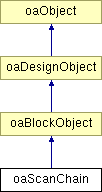oaScanChain Class Reference
Inheritance diagram for oaScanChain:

Detailed Description
Scan chains are a common technique used to make designs testable. With scan chains, a series of registers, often called scan latches, are linked together as a shift register so that test patterns can be written into those registers by putting the design in test mode and shifting the desired values in. After a test is run the result values can be read out in the same manner. Designs may have more than one scan chain.
Scan chains often get special treatment by place and route tools which can take advantage of the fact that their detailed order and partitioning into individual scan chains can be done late in the design flow.
OpenAccess will model scan chains at several stages of their specification. It can indicate which cells are scan latches and which instTerms on those cells are the scan-in and scan-out connections. This is represented with the oaScanChainInst class.
OpenAccess will model sets of scan latches that will belong to a given scan chain with the oaScanChainSet class. These sets can specify either that the order of the scan latches in the set is fixed or that they are unordered and can be moved.
Finally, OpenAccess will model the grouping of scan sets into whole scan chains with the oaScanChain class. Where the design wants to limit the length of each scan chain and have multiple scan chains instead of one long one, the scan chains can have a partition name. The scan chain sets within such a scan chain may be swapped with other scan chains with the same partition name.
OpenAccess does not store the complete connectivity of the scan chain, just the scan latches and scan in and scan out terminals.
The oaScanChain class can be observed by deriving from oaObserver<oaScanChain>.
Member Function Documentation
|
|
This function creates a scan chain. The scan chain can specify the primary scan-in and scan-out points for this chain.
- Parameters:
-
| block | The block in which to create the scan chain |
| name | The name of the scan chain to create |
| startObject | The scan-in object for the scan chain: an oaBitTerm, oaInstTerm, or oaScanChainInst. |
| stopObject | The scan-out object for the scan chain: an oaBitTerm, oaInstTerm, or oaScanChainInst.. |
| partitionName | The name of the scan chain partition |
| maxBits | The maximum number of data bits that can be contained in the oaScanChainInsts that belong to the oaScanChainSets that get associated with this scan chain |
- Exceptions:
-
|
| void oaScanChain::destroy |
( |
|
) |
|
|
|
|
This function destroys this scan chain, removing it from the database. |
| oaScanChain * oaScanChain::find |
( |
const oaBlock * |
block, |
|
|
const oaString & |
name |
|
) |
[static] |
|
|
|
This function searches the specified block for a scan chain with the specified name. If the scan chain is found, it is returned. Otherwise, NULL is returned. |
| oaUInt4 oaScanChain::getMaxBits |
( |
|
) |
const |
|
|
|
This function returns the maximum number bits that can be stored in this scan chain. A value of zero is interpeted as an unlimited bit length value.
- Exceptions:
-
|
| void oaScanChain::getName |
( |
oaString & |
name |
) |
const |
|
|
|
This function fills out name with the name of this scan chain. |
| void oaScanChain::getPartitionName |
( |
oaString & |
name |
) |
const |
|
|
|
This function fills out name with the partition name of this scanChain. |
|
|
This function returns a collection of scan chain sets in this scanChain. |
| void oaScanChain::setMaxBits |
( |
oaUInt4 |
maxBits |
) |
|
|
|
|
This function changes the maximum number of bits allowed on this scan chain.
- Exceptions:
-
|
| void oaScanChain::setName |
( |
const oaString & |
name |
) |
|
|
|
|
This function changes the name of this scan chain to the specified name.
- Exceptions:
-
|
| void oaScanChain::setPartitionName |
( |
const oaString & |
name |
) |
|
|
|
|
This function changes the name of this scan chain partition to the specified name. |
Member Enumeration Documentation
The documentation for this class was generated from the following files:
Return to top of page
Copyright © 2002 - 2010 Cadence Design Systems, Inc.
All Rights Reserved.






